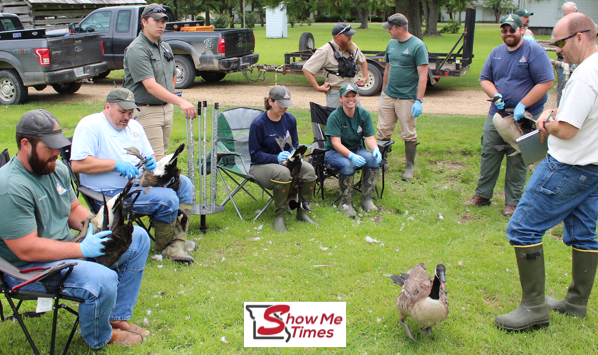Sports
Geese Banded at the Dexter City Pond
July 06th 2017 by Dee Loflin

Dexter, Missouri - More than 60 geese were captured at the Dexter Pond on One Mile Road last week. About half were new geese that were banded the others were banded from years past. This is a great opportunity to study the birds and to monitor their survival and harvest rates in our area. The geese were not harmed and were released back to the pond within less than one hour.
Canada geese in Cape Girardeau, Stoddard, Dunklin, Mississippi, and St. Francois counties were rounded up and banded this week as part of the Missouri Department of Conservation's (MDC) efforts to track them. MDC biologists check the numbers on geese that already have leg bands and put new leg bands on birds that are without. The purpose is to monitor survival and harvest rates of Canada geese and collect information that influences hunting season lengths and limits.
"We can also learn interesting things about where geese go after they get banded or how long they may live in the wild," said MDC Wildlife Management Biologist Kevin Brunke. "We get data back from birds when hunters harvest a banded goose and report its band number."
When a banded bird is harvested, hunters report band numbers to www.reportband.gov or by calling 1-800-327-BAND. This cooperation between conservation organizations and hunters helps biologists learn about and manage the species.
"The Canada goose population seems to be stable in Southeast Missouri," Brunke said. "The numbers of birds we catch at individual locations varies from year to year, but overall, the population levels do not seem to be increasing or decreasing."
Brunke and other MDC biologists submit their locally collected data to MDC resource scientists who enter the data into the U.S. Geological Survey's Bird Banding Laboratory's database. Every bird that is banded goes through the Bird Banding Laboratory's system. From that system, researchers and biologists can use data from across the nation or local data to answer specific questions they may have in managing the bird populations. Managing the species benefits the birds and the people who enjoy watching and hunting them.
"Canada geese offer many Missourians the chance to view wildlife in their own back yard this time of year," Brunke said. "Many parks or residential areas with manicured grass and small lakes attract geese to raise their broods and molt their wing feathers. In the fall, many hunters enjoy hunting geese."
Brunke said sometimes conflicts arise when one neighbor may enjoy watching the geese through the summer, but another neighbor doesn't appreciate the mess they leave behind on their lawn, docks, or driveways.
Canada geese live most often on farm ponds, lakes, and marshes. Once close to extinction, this species has made an amazing recovery. They can be so numerous they cause problems from overgrazing, abundant droppings, collisions with aircraft, destruction of newly sprouted crops, and more. The Migratory Bird Treaty Act protects these geese, their nests, and eggs, but the Missouri Department of Conservation can issue permits to help control nuisance geese.
Canada geese play an important role in nature, as many predators feed on the eggs and young. In addition to their grazing in wetlands throughout the state, Canada geese and other waterfowl have an important impact when they gather in wetland staging areas along migration routes.
More information about Canada geese can be found at https://nature.mdc.mo.gov/discover-nature/field-guide/canada-goose.
Last Updated on July 06th 2017 by Dee Loflin
https://showmetimes.com/Blogpost/v7qk/Geese-Banded-at-the-Dexter-City-Pond

